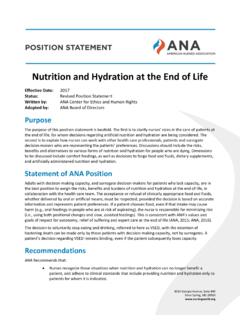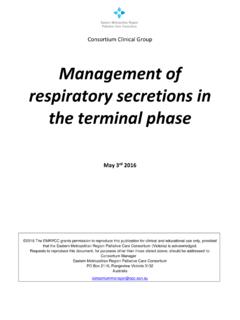Transcription of Palliative Care Case Study and Discussion
1 Palliative care case Study and Discussion Anna Lee Hisey Pierson, M. Div., BCC-HPCC Judy Burke, September 18, 2015 1 Disclosure There are no relevant conflicts of interest to disclose for presenters associated with this presentation. 2 HIPAA Information in this case Study is not to be shared outside learning environment. Patient/family information has been altered to protect their identify. 3 Objectives 1. Describe impact of informed consent on patient outcomes 2. Explain the importance of honoring Advance Directives 3. Demonstrate influence of multicultural background of health care providers and the care perspective 4. Explain how an interdisciplinary Palliative care Team utilizing a transdisciplinary approach impacts patient outcomes 4 Transdisciplinary Team Approach A transdisciplinary team allows members to contribute their own knowledge and expertise, but efforts are collective in determining best ideas or approaches, according to the North Central Regional Educational Laboratory overview of the topic.
2 When transdisciplinary teams are used in health care , providers from multiple disciplines collaborate and share ideas from the beginning to create a total health care plan that covers all necessary diagnoses and treatment for a patient. Neil Kokemuller, Demand Media, , 5 Presenters Judith Burke, LCSW Married Middle aged Caucasian Protestant faith Master s Trained Licensed Clinical Social Worker Completed fellowship in advanced psychoanalytic theory and practice Anna Lee Hisey Pierson, MDiv, BCC-HPCC Married Protestant faith Middle aged Parent Caucasian Master s Trained Board Certified Hospice and Palliative Chaplain Background in nursing and social work 6 Hospital Culture Level I Trauma Center Community, non-academic hospital Licensed for 333 beds Heterogeneous physicians Homogenous clinical staff Located in a wealthy suburban county in Illinois Interdisciplinary Palliative care Team ( Palliative certified or in process=Physician, Nurses, Social Worker, Chaplain)
3 7 case Study Patient Demographics Age Mid 80+ female Caucasian Lutheran Divorced Three children Independent Retired Academic Middle Class Grandparent, great grandparent Activities Family Lunch with friends Cards Church involvement Dancing 8 Medical History Chronic Atrial Fibrillation C-Diff Hypertension Hyperlipidemia 1954 Hysterectomy 1970 Lumpectomy bilateral breast 9 Chronology of Events Day 1 Emergency Room Ambulance admit Unresponsive to verbal commands, not in acute distress -CT head-acute appearing infarct viewed -MRI-very large cerebral infarct -MRA-showed occlusion of left middle cerebral artery Day 2 Inpatient Admission Telemetry Chest x-ray-cardiomegaly with large pleural effusion bilaterally NG-feeding placed 10 Events continued Day 3 Code status- No Intubation/No CPR Day 4 Rapid Response Team(RRT)
4 -Rapid VR and high BP- Family at bedside Ist Ethical Dilemma Palliative care Triggered consult- await CCU bed Poor prognosis documented Day 5 RRT-Hypoxia, 70% O2, copius secretions 11 Events continued Day 6 CCU Health care Power of Attorney provided by family, naming daughter as agent Day 7 Family refusing Palliative care Consult Patient opened eyes for first time Day 8 Palliative care Goals of care phone conference Day 9 - Restraints placed 12 Events continued Day 10 Follows no commands Day 11 Palliative care Meeting Scheduled New Cardizem Drip-Atrial Fibrillation Day 12 Family requested DNR, hospice Day 13 Hospice meet with family Attending physician reports improvement and denies hospice 13 Events Continued Day 13 Pneumonia diagnosis Day 15 Ethics Consult Hospice reconsulted per daughter request Peg tube placement on hold-atrial Fibrillation Day 16 Hospice evaluation Cancelled Peg Insertion POLST-Full DNR, comfort Attending physician agreed with hospice 14 Events Continues Day 17 Transferred to Skilled Nursing care Facility on Hospice 15 Palliative care Palliative care is an approach that improves the quality of life of patients and their families facing the problem associated with life-threatening illness, through the prevention and relief of suffering by means of early identification and impeccable assessment and treatment of pain and other problems, physical, psychosocial and spiritual.
5 16 Palliative care Provides relief from pain and other distressing symptoms; Affirms life and regards dying as a normal process; Intends neither to hasten or postpone death; Integrates the psychological and spiritual aspects of patient care ; Offers a support system to help patients live as actively as possible until death; 17 Palliative care uses a team approach to address the needs of patients and their families, including bereavement counselling, if indicated; will enhance quality of life, and may also positively influence the course of illness; is applicable early in the course of illness, in conjunction with other therapies that are intended to prolong life, such as chemotherapy or radiation therapy, and includes those investigations needed to better understand and manage distressing clinical complications. 18 Domains of Palliative care Domain 1: Structure and Processes of care Domain 2: Physical Aspects of care Domain 3: Psychological and Psychiatric Aspects of care Domain 4: Social Aspects of care Domain 5: Spiritual, Religious and Existential Aspects of care Domain 6: Cultural Aspects of care Domain 7: care of the imminently dying Patient Domain 8.
6 Ethical and Legal Aspects of care 19 Psycho-Social Obtaining information from the patient regarding who the patient perceives to be their most important support person(s) Identify the primary caregiver(s) Discuss Advanced care Planning with patient, family, friend(s), and/or caregiver(s) Explain to patient/family/caregiver(s) what services and resources can be provided by the Palliative team Conduct a needs assessment, including social, psychological, spiritual, cultural, financial, vocational, and practical aspects of functioning Link patient and family to needed community resources, : public assistance, food pantries, clothing and utilities assistance 20 Spirituality Spirituality refers to the way we seek and express ultimate meaning and purpose in our lives. It is also the way we experience our connectedness to others, to nature, and to God or the sacred. Christina Puchalski, , , ,1 Betty Ferrell, , , , ,2 Rose Virani, , , , ,2 Shirley Otis-Green, , , , ,2 Pamela Baird, , al, Improving the Quality of Spiritual care as a Dimension of Palliative care : The Report of the Consensus Conference , Journal of Palliative care , Vol.
7 12, Number 10, 2009 21 Psycho-Social /Spiritual Identifiers Needs Interventions Outcomes Conflicted Belief System Complicated grief with death of estranged brother Expressed importance of prayer, scripture and music Discussed faith tradition and God s Plan Explored impact of Physicians beliefs on informed consent Explored integration of sense of guilt and loss of brother Validated sense of sadness of mother s loss functionality Explored source of strength Provided scripture, prayer, music Family discussing plan of care together though varied beliefs Glimpse of grief and dialogue of impending loss Comforted through sharing prayer, scripture and music 22 Psycho-Social /Spiritual Identifiers Needs Interventions Outcomes Existential Concerns Anger at Physicians Explore understanding of Suffering Discuss God s Plan Diffused anger Explored sense of health realities Reduced feeling of God s punishment Restored belief in God Reduced shock of altered functioning Coping realistically with prognosis 23 Psycho-Social /Spiritual Identifiers Needs Interventions Outcomes Physician/associate cultural/religious Influences Lack of informed consent Explored physician/associate belief system Facilitated Ethics Consult Supported nursing/management associates Explored meaning of patient s Advance Directive wishes Educated on role of agent Facilitated Ethics Consult Facilitated consensus of medically indicated prognosis Physician communicated informed consent Congruent medical information provided by all physicians and associates Associate moral distress
8 Reduced Agent able to act on patient s Advance Directives wishes Desired quality of life respected 24 Impact of Transdisciplinary Palliative care Team Interdisciplinary trained Palliative care Professionals Daily Morning Huddle Palliative program longevity and continuity of staff Transdisciplinary engagement-patient/family interventions Recognition of Palliative care as integral aspect of patient care Ethical awareness and integration of cultural/religious diversity Comprehensive, trust-filled, valued interdisciplinary team of experts challenging one another and continuing to learn 25 Conclusion Aligned patient s plan of care with values Agent followed patient s Advance Directives Physicians provided informed consent Physicians supported medically indicated plan of care Supported faith and values Moral Distress of associates resolved 26 Questions 27 Thank You 28 630-275-1189 630-275-6969 29 630-275-1189 630-275-6969 30

